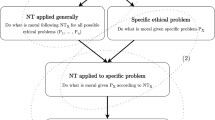Abstract
In the last decade, the study of moral heuristics has gained in importance. I argue that we can consider speciesism as a moral heuristic: an intuitive rule of thumb that substitutes a target attribute (that is difficult to detect, e.g. “having rationality”) for a heuristic attribute (that is easier to detect, e.g. “looking like a human being”). This speciesism heuristic misfires when applied to some atypical humans such as the mentally disabled, giving them rights although they lack rationality. But I argue that it is not necessarily irrational or inconsistent to hold on to this heuristic rule, because we have to take time and knowledge constraints, uncertainty aversion and emotional costs into account. However, this “heuristic defense” of speciesism uses a target attribute (rationality) that has implications of disrespect towards some atypical humans. Therefore, based on notions of impartiality and compassion, I argue for a morally better target attribute: sentience (“having a sense of well-being”). “Being a vertebrate” is suitable as a corresponding heuristic attribute because it is easy to detect and has a strong correlation with the target attribute of sentience.
Similar content being viewed by others
Notes
Although one can argue that virtues like honesty and fair-mindedness indirectly refer to a notion of rationality. However, the virtue of compassion directly and strongly refers to suffering and sentience.
The coupling between rights and species is really far-fetched, because we cannot see a connection between rights and genes or between rights and the ability to beget fertile offspring.
In common morality, the attitudes towards different non-rational beings are not consistent. Consistency can be improved by uplifting the moral status of non-human vertebrate animals, due to their sentience.
References
Bernstein, M. (2004). Neo-speciesism. Journal of Social Philosophy, 35(3), 380–390.
Carruthers, P. (1992). The animals issue: Moral theory in practice. Cambridge: Cambridge University Press.
Chappell, T. (2011). On the very idea of criteria for personhood. Southern Journal of Philosophy, 49(1), 1–27.
Cohen, C. (1997). Do animals have rights? Ethics and Behavior, 7(2), 91–102.
Dombrowski, D. (1997). Babies and beasts. The Argument from marginal cases. Chicago: University of Illinois Press.
EFSA (2009). General approach to fish welfare and to the concept of sentience in fish. Scientific Opinion of the Panel on Animal Health and Welfare, EU Food Safety Authority, Parma, Italy.
FRA. (2010). The right to political participation of persons with mental health problems and persons with intellectual disabilities. Vienna: European Union Agency for Fundamental Rights.
Gilligan, C. (1982). In a different voice. Cambridge MA: Harvard University Press.
Grau, C. (2010). Moral status, speciesism and Liao’s genetic account. Journal of Moral Philosophy, 7(3), 387–396.
Griffin, D. (2001). Animal minds: Beyond cognition to consciousness. Chicago: University of Chicago Press.
Horta, O. (2010). What is speciesism? The Journal of Agricultural and Environmental Ethics, 23, 243–266.
Huther, C. (2005). Can speciesism be defended? A discussion of the traditional approach to the moral status of animals. Munich: Ludwig-Maximilians-Universität München.
Kahneman, D., & Shane, F. (2002). Representativeness revisited: Attribute substitution in intuitive judgment. In T. Gilovich, D. Griffin, & D. Kahneman (Eds.), Heuristics and biases: The psychology of intuitive judgment (pp. 49–81). Cambridge: Cambridge University Press.
Kahneman, D., Tversky, A., & Slovic, P. (Eds.). (1982). Judgment under uncertainty: Heuristics & biases. Cambridge: Cambridge University Press.
Kaufman, F. (1998). Speciesism and the argument from misfortune. Journal of Applied Philosophy, 15(2), 155–163.
Lee, P., & George, R. (2008). The nature and basis of human dignity. Ratio Juris, 21(2), 173–193.
Liao, S. M. (2010). The basis of human moral status. Journal of Moral Philosophy, 7(2), 159–179.
Margolis, H. (1987). Patterns, thinking and cognition: A theory of judgement. Chicago: University of Chicago Press.
McMahan, J. (2005). Our fellow creatures. The Journal of Ethics, 9, 353–380.
Nobis, N. (2004). Carl Cohen’s ‘kind’ arguments for animal rights and against human rights. Journal of Applied Philosophy, 21(1), 43–59.
Rowlands, M. (1997). Contractarianism and animal rights. Journal of Applied Philosophy, 14(3), 235–247.
Rowlands, M. (1998). Animal rights: A philosophical defence. New York: St Martin’s Press.
Ryder, R. D. (1971). Experiments on animals. In S. Godlovitch, R. Godlovitch, & J. Harris (Eds.), Animals, men and morals (pp. 41–82). London: Victor Gollanz.
Scruton R. (1998). Animal rights and wrongs. Demos.
Shaw, W. H. (1999). Contemporary ethics: Taking account of utilitarianism. Oxford: Blackwell.
Singer, P. (1975, 1990). Animal liberation, a new ethics for our treatment of animals. 2nd ed., New York Review of Books.
Sinnott-Armstrong, W., Young, L., & Cushman, F. A. (2010). Moral intuitions as heuristics. In J. Doris et al. (Eds.), The Oxford handbook of moral psychology. Oxford: Oxford University Press.
Slote, M. (2001). Morals from motives. Oxford: Oxford University Press.
Sunstein, C. (2005). Moral heuristics. The Behavioral and Brain Sciences, 28, 531–573.
Tanner, J. (2006). Marginal humans, the argument from kinds and the similarity argument. Facta Universitas, 5(1), 47–63.
Tanner, J. (2009). The argument from marginal cases and the slippery slope objection. Environmental Values, 18, 51–66.
Van den Berg, F. (2011). Harming others: Universal subjectivism and the expanding moral circle. PhD thesis, Universiteit Leiden.
Wilson, S. (2001). Carruthers and the argument from marginal cases. Journal of Applied Philosophy, 18(2), 135–147.
Acknowledgments
I would like to thank Dianne Scetrine, Tim de Smet and anonymous reviewers for helpful comments and proofreading.
Author information
Authors and Affiliations
Corresponding author
Rights and permissions
About this article
Cite this article
Bruers, S. Speciesism as a Moral Heuristic. Philosophia 41, 489–501 (2013). https://doi.org/10.1007/s11406-013-9420-y
Received:
Revised:
Accepted:
Published:
Issue Date:
DOI: https://doi.org/10.1007/s11406-013-9420-y



